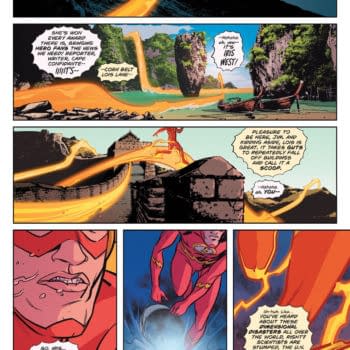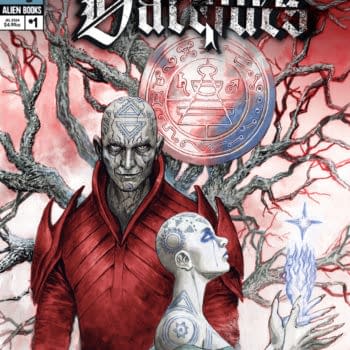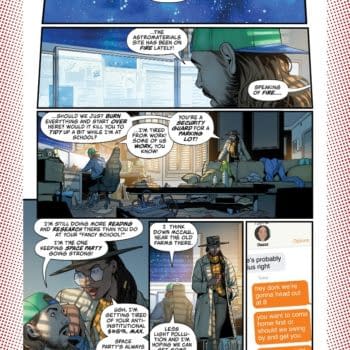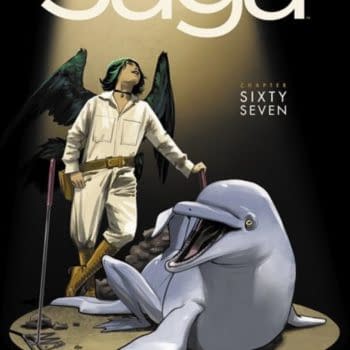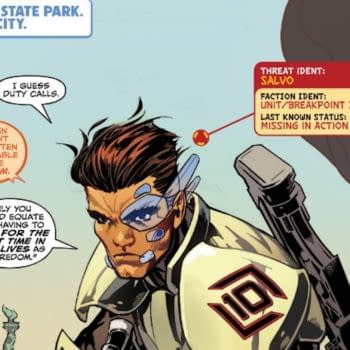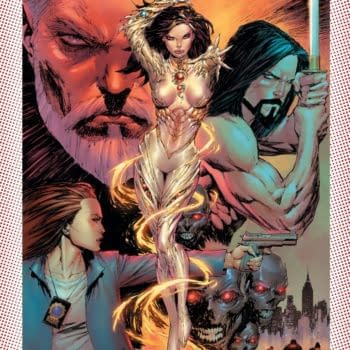Posted in: Comics, Recent Updates | Tagged: Comics, entertainment, Georgia Ball, hasbro, idw, Kate Cook, Kids Comics, littlest pet shop, Matt Anderson
Littlest Pet Shop Supplies 'Brain Food' For Kids – The Bleeding Cool Interview With Georgia Ball and Matt Anderson
Coming to a shop near you on May 7th, it's the charge of the cute cuddly animals and their human companion. It would be nearly impossible for anyone with children in their lives in the last decade and more to have remained ignorant of the Littlest Pet Shop franchise from Hasbro (as acquired from Kenner). The line of toys, making pocket-sized pets and diminutive abode, often flocked for extra cuddliness, has been ubiquitous in toy stores and toy aisles, and their popularity has never waned over time. They made an early jump to animated series and that, too, was a success as well as generating coloring books, stuffed animals, and several Nintendo DS games.
The series has the potential to take off in all-ages comics like My Little Pony. Though Littlest Pet Shop is a newer concept than Ponies, its longevity and multi-media and product reach have been well established. Littlest Pet Shop is already part of the youthful psyche and have plenty going for them in making a jump to the comics medium. Some of the strengths of the concept are that there are a lot of potential characters in the "pet" category with new and quite varied personalities to explore, and there will be a strong central character established for the comic narrative in the person of Blythe, who can communicate with the pets. The stories that writers Georgia Ball (Strawberry Shortcake, My Little Pony) and Matt Anderson (Kung Fu Panda) are exploring are likely to mirror the concerns of young readers as they grapple with daily issues.
The new series engages with many of the issues that surround all-ages comics such as providing solid enough content to provide entertainment as well as meaningful life-narratives for kids and potentially bringing more young people to the comics medium as readers. Based on this interview with Georgia Ball and Matt Anderson, there's a depth of thought in meeting the needs of young readers in Littlest Pet Shop that may well accomplish both. Here's hoping this becomes another avenue for comics-curious kids to develop a love for the medium.
And here's a sneak peek at a cover by Kate Cook (My Little Pony) for issue #1:
Hannah Means-Shannon: What impact do you think reading comics has on kids that's different from reading a prose story or watching cartoons?
Georgia Ball: Comics have a visual language of their own that even some adults have trouble deciphering, and following a sequence of images across a page takes a level of intuition and participation from the reader that no other medium duplicates. Comic books ask kids to trace the action themselves and it makes the experience much less passive. Digital guided-view takes some of the work out of it but the action between the panels isn't filled in for you the way it is in a cartoon.
I don't shy away from using a more advanced vocabulary if it suits the dialog and the show team encourages some kind of learning experience in every story. Cartoons have a tendency to resolve their themes with a pat answer but Hasbro has allowed me to present some complicated ideas without handing down a decisive moral: In one issue for instance the characters wonder if it still counts as a good deed if they benefit from it and I leave that conclusion up to the reader. In short, comics are brain food.
Matt Anderson: While digital distribution and the sustained prevalence of comic book-based movies is changing this, I've always seen comics as a more reader-involved experience because you have to seek them out. Comics aren't everywhere in the way that prose and cartoons are. There isn't a comic shop in every town. So, the fact that there is a sort of journey just to acquire a comic (in my opinion) enhances the reading experience and makes the reader more engaged. When I was younger, the process of getting comics was often just as exciting as reading the comics themselves.
HMS: When you sit down to write an all-ages comic, what are some of the goals you have in mind? Are you thinking, "We have to shape the next generation here" or are you more geared toward entertaining and just being imaginative for your young readers?
GB: I don't overcrowd the page with too many panels or word balloons and I try to be as efficient with dialogue as possible so the balloons have some whitespace. But the comics I enjoyed reading as a kid were stories I could grow into and continue enjoying on some level into adulthood. If a story was watered down for my benefit I could sense it right away, and although I might read the issue if someone bought it for me I wasn't going to ask for the next issue. I focus on writing stories with humor and layers that take advantage of the medium and the skills of my artist. I continue as an adult to subscribe to all-ages comics alongside my long list of horror titles and I want Littlest Pet Shop to be the kind of comic that has appeal well after the readers are out of grade school. A fan once started a letter to me about my My Little Pony Celestia Micro that began, "You may have thought you wrote a simple children's story…", but I didn't think that at the time. My approach to every project is to never write a simple anything.
MA: Personally, I lean more toward the latter and keep being entertaining as my primary focus. Of course, my hope is that through providing entertainment to a younger audience, I am encouraging them to become regular comic book readers.
HMS: Regarding Littlest Pet Shop, I see that Georgia has experience writing My Little Pony and Strawberry Shortcake, and Matt has a background in Kung Fu Panda, so I have to jokingly ask, is Georgia on "human character" duties and Matt on "animal character" duties? Or is it more evenly divided between characters you took a shine to? It seems like a particularly apt writing team!
GB: I'm writing the longer stories and Matt is writing the short stories, so we're not collaborating in that sense. We didn't read each other's contributions to the first issue until the proofs came out. But this is a reunion for us, as Matt was the original editor on the Strawberry Shortcake comics, and the email he wrote asking me to work on that series brought me into the industry. I'd been writing a webcomic called Scooter and Ferret for six years with my husband and Matt saw it. It featured a woman whose best friends were a talking ferret, dog and goldfish, so I was already accustomed to giving creatures human personalities. I was brought in to Ape Entertainment to work on a series that spoke to a female audience, but as soon as I was given the opportunity to pitch for a comic targeted at boys I jumped on it to avoid being typecast. I wrote short stories for Fruit Ninja for almost a year and I have three Scooby Doo issues from DC coming out in 2014.
I've also written a Kung Fu Panda story and Matt's written a Strawberry Shortcake story, so I would say we're willing to work on whatever character someone will give us the chance to write for. My favorite characters on Littlest Pet Shop are Zoe and Sunil, so I gave each of them an issue where they get a little more attention.
MA: Georgia pretty much nailed it in calling this more of a reunion than collaboration. That being said, if we continue beyond this initial series – I'd love to have the opportunity to directly co-write a script with her.
HMS: Is humor something that's part of this series? How do you come up with humor that you know will resonate with kids?
GB: I touched on some dark themes with my My Little Pony issue, but there were also comedic lines that readers really liked and I took note of them. I brought all of that and then some to Littlest Pet Shop and I hope it shows; I've gotten a lot of compliments from Hasbro on the comedic beats in the scripts so maybe the audience will feel the same way. I bounce jokes off my husband, Scott, who never laughs, so that's very grounding, and my editor recently gave me ten minutes to revise a punchline that didn't make any sense. My solution made him laugh out loud and feedback doesn't get more real than that unless you're in stand-up. I keep up with pop culture and I'm into some of it myself, so I make sure at least some of the parodies speak to kids too. For little kids who may just be looking at the pictures, I have opportunities to include physical humor. But I always have adults in mind too, and readers may recognize references to everything from Magic the Gathering to Twelve Monkeys.
MA: Humor is definitely a part of the series. To me, one of the most appealing aspects of the show is the variety of humor it uses. In a single episode you can (and usually do) get everything from slapstick and over the top parody to much more grounded, character-based humor. That variety is something I strove to bring to each of my stories. No one story is the "slapstick story" or the "grounded story" – but rather, each is a mixture. And it's in that variety that I think you get humor that will resonate with kids. If one kind of joke doesn't strike them, all they need to do is read the next couple of panels and they'll likely find something that will.
HMS: I don't know how much into fairy and folk tales you all might be as writers, but we do have a long multi-cultural tradition of stories where lead characters can talk to animals, and the person who can do that is usually the "hero". Is Blythe Baxter a heroic character? What kind of traits did you imbue her with?
GB: I like Blythe because she's a normal girl. She's imperfect, ambitious and she carries a few anxieties, but she's also kind, loving and intelligent. I hesitate to call her a hero because to me that implies a "hero's journey" be present in the story. Blythe is really just trying to get through the day most of the time. Her ability to talk to animals allows us to enter the world of the pets and make friends with them through her. Her troubles are easy to identify with because we've all had friends that get us into situations we can't easily explain.
MA: For me, while Blythe doesn't fit the traditional "hero" mold, I do believe there is something inherently heroic in how true to herself she is. Blythe is comfortable being Blythe – and for me, that makes her a wonderful and inspiring character to write. Unfortunately, that is not something you see in a lot of stories – especially ones starring younger females.
HMS: Does a comic like Littlest Pet Shop have a concern for the role of animals in our lives? Is this a work that's going to celebrate our human relationships with our animal best friends? Are issues like ethical treatment of animals likely to come up?
GB: I do think the whole concept celebrates the idea of having pets and considering them personal friends. It was important to Hasbro from the beginning that the pets behave like pets in most instances; the dogs walk on all fours, all of the pets enjoy chew toys and they frequently wear a leash. As for touching on the ethical treatment of animals… It was funny when Berkeley Breathed had Opus storm the Mary Kay facility but I'm probably not going to go there.
MB: While we'll be steering clear of politics and personal agendas in this series, I can say without a doubt that it is a celebration of animals and the joy that they bring into our lives.
HMS: What kinds of stories is the comic poised to tell? Daily dramas? Adventures? What are our protagonists likely to get up to?
GB: Littlest Pet Shop is primarily a daily drama concept. Most of the adventures the pets have are fantasy sequences, but adventure also comes from how the characters perceive the situation. Blythe and the pets often think their problems are life and death situations and there is a lot of humor to be found in playing with their emotions. In the issues ahead, Blythe obsesses over a card game, Zoe steps all over her friends to get what she wants and Sunil has to make an unlikely ally, with plenty of pop culture parodies along the way.
MA: The stories are very much in the "slice of life" vein (which does seem a little strange to say since the bulk of our cast is talking animals). In one story, the pets are worried about being replaced when a box of "Pet Rocks" gets delivered to the shop. In another, Blythe takes her dad out to see his favorite heavy metal band for Father's Day. Again, my stories are much shorter than Georgia's, so I tried to focus in on more of a singular moment in an "average day" at the pet shop and explore that.
HMS: I know that as far as the Hasbro toy-line goes that there a HUGE number of pet shop characters. Does that mean that the comic has a limitless cast? Can you tell us a little about the cast of the comic that you've chosen to focus on?
GB: I only bring in a character that hasn't appeared on the show when he or she serves a purpose in the story I'm telling. I understand that people pick up licensed comics to see more of characters they already know and love and I want to support that desire, not get in the way. But I needed to bring a new pet in for issue three to give Sunil a special challenge and Hasbro was completely behind it. Sunil and Blythe learn a parallel lesson as she deals with the Biskit Twins. I brought in Madame Pom for an issue because I love Zoe and wanted to pit her against an interesting foil, and I'm working on a script now with Buttercream. I did take character popularity into account when deciding who to feature, but sometimes I made the decision based on which would be the best fit for the concept.
MA: Since I'm working with a smaller page count, I wanted to make sure to stick to the cast you recognize from the show and do my best to showcase them in all their glory. Also, just from a scripting standpoint, it would be difficult to give the pets and Blythe time to shine while also introducing a never before seen character in only 4 pages.
Although, I do want to make note of the fact that I did have Roger Baxter (Blythe's dad) co-star in one story. While it's hard to choose a favorite character, I do have a special affinity for that guy and absolutely loved writing him!
Hannah Means-Shannon is EIC at Bleeding Cool and @hannahmenzies on Twitter













